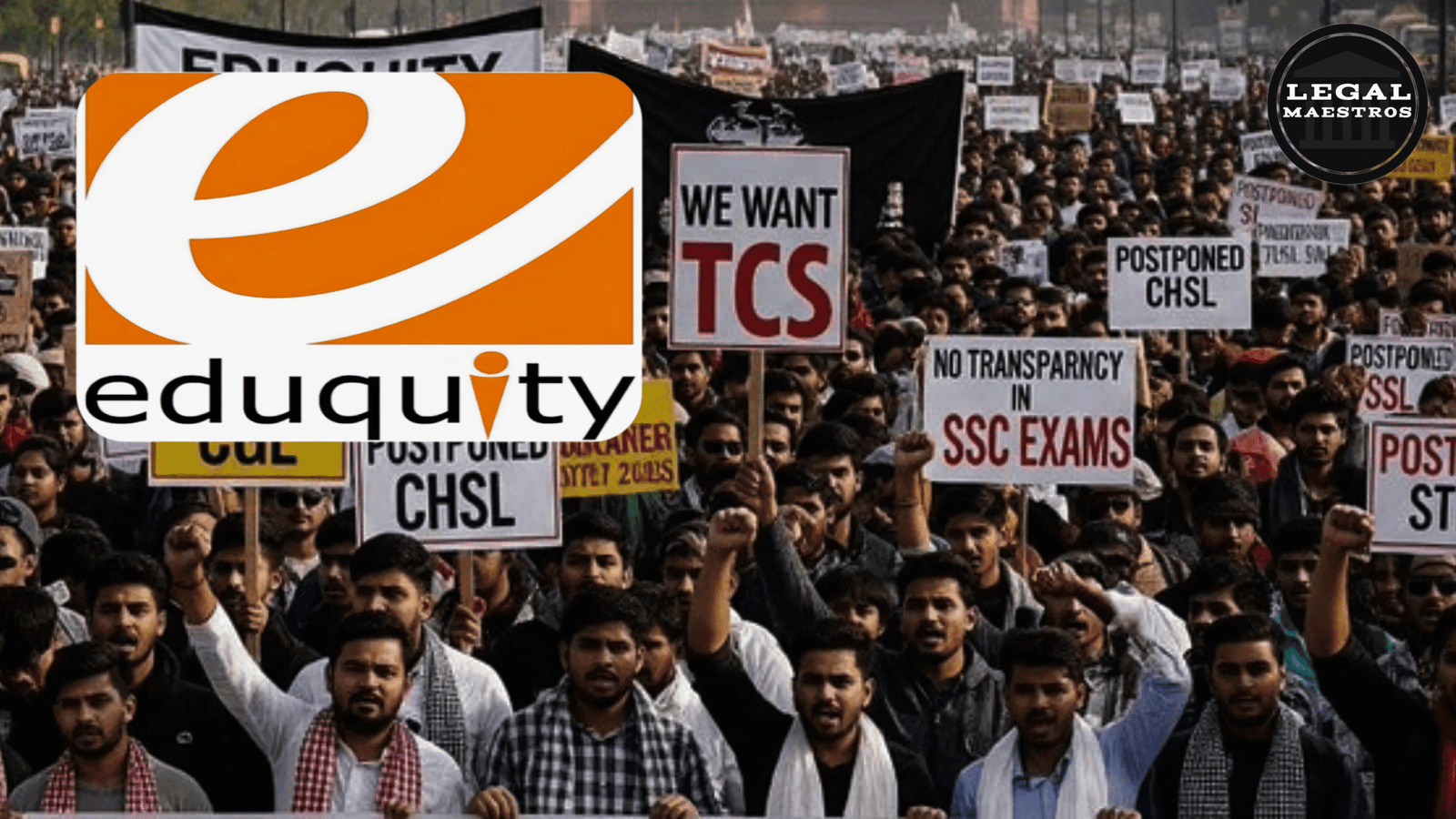
At the heart of a crisis of integrity in the Indian system of public examination, and a firm that markets itself as a pioneer in the use of online examination in India, is Eduquity Career Technologies.
Although Eduquity has a record of interest in the case of paper leak and cheating, as well as of a murky record that resulted in its formal blacklisting in 2020 by a directorate under a central government ministry, it has repeatedly won major stakes construction contracts on behalf of the Bhopal-based (Madhya Pradesh) and Staff Selection Commission (SSC).
This report outlines a flinching trend of suspected fraud and mismanagement which includes paper leaks, technical failures and flaws in candidate selection which has sharply affected the career of millions of students. Comprehensive study of the legal and constitutional aspects indicates such liabilities as under the Bharatiya Nyaya Sanhita (BNS) on cheating, the Companies Act, 2013 on corporate fraud and the newly enacted Public Exams (Prevention of Unfair Means) Act, 2024.
Moreover, these structural failures create immense questions of raising concern over the right to equality and right to livelihood of students as per Articles 14 and 21 in the Constitution of India. Direct instances of political contribution to procure contracts is lacking in the given materials, but based on the repetitive mention of politically connected centers in the stated scams, it is clearly indicated that there was an undue influence on the process of procurement, which contradicts a meritocratic approach and trust.
1. Introduction: India, Integrity Crisis in Public Examinations
1.1 Background: The Latest Protests/Shared Concerns
The competitive examination system of India, the key to access to higher education and public jobs, is in process of overcoming a severe crisis of integrity. Some of the common allegations with this crisis include leaking of papers, systematically cheated, and gross mismanagement that have caused a stir of uproar and students numbering to a nationwide demonstration.
The protests of the staff selection commission (SSC) in the recent past are an example of the intense frustration of aspirants who have felt their exams were interrupted and do not feel it was fair. The example of the NEET exam, and its associated controversies is indicative of the wider issue.
It is not just a few individuals who are involved in these malpractices but the magnitude of the malpractices is pervasive indicating a more deeper systematic issue and not an isolated phenomenon. Leakage of papers in different states has been reported as high as a minimum of 48 cases in the past 5 years, involving an approximate 1.4 crore applicants.
There has been an alarming frequency in the leaking of the papers and a generalised belief that the leak of papers has become the new trend within the circles of competitive examinations in India.
The repetitiveness of those protests, as well as the participation of several exam agencies, indicates that the difficulties are fundamental, not related to isolated cases of malpractice, and directly to organizational weaknesses inherent in the examination system of this country.
1.2 Overview of Business Model and Controversies Eduquity Career Technologies
Having been established in 2000 by Ramachandra Dhirendra and Visweswar Akella, Eduquity Technologies has positioned itself as an early adopter of online exams and assessments in India.
The company touts a long history of experience; it has proctored over 100 million candidates, and it has a long history of a perfect pass rate after more than 25 years.8 Eduquity provides assessment solutions to diverse clients including government bodies, education and corporate organisations.
Nonetheless, the so-called image of reliability bears simplified contrast to what is known historically. The name of Eduquity has been linked multiple times with cases of paper leak and cheating.
More importantly, in 2020 the firm was officially made ineligible or blacklisted by the Central Directorate General of Training and cannot currently organize any further examinations.5 This direct conflict between the marketing material of the company and its official blacklist status underscores a gross credibility gap.
All such situations leave a serious dent on integrity of the procurement processes and the due diligence practised by awarding authorities that have seen the government bodies still contract Eduquity even after being blacklisted.
1.3 Scope and Purpose of the Report
This report seeks to give a critical and analytical report on the suspected examination malpractices committed by Eduquity Career Technologies. It will carefully analyze certain cases of fraud and mismanagement, evaluate their significant effect on the careers of students and carry out in-depth, legal as well as constitutional analysis of the liabilities and rights of the same.
The variable of this critical analysis will majorly center on the involvement of Eduquity in Madhya Pradesh recruitment scams, such as Teacher Eligibility Test and Patwari Exam along with Staff Selection Commission (SSC) Phase 13 exam. The report is going to explore the liability that might befall a corporation as well as an individual under the Bharatiya Nyaya Sanhita (BNS), Companies Act, 2013 and the recently passed the Public Examinations (Prevention of Unfair Means) Act, 2024.
In addition, it will also examine the infringement into the basic rights of the students under the Indian constitution under Article 14 (Right to Equality) and Article 21 (Right to Life and Personal Freedom). Another issue that will be handled in the report is the controversial aspect of political influence in contract awarding and investigation of the available information to ascertain the implications.
2. Alleged Malpractices of Eduquity: Fraud and Mismanagement A Trend
2.1 Past Experiences: Blacklisting and Histories of Past Incidents
In 2020, Eduquity Technologies was officially blacklisted by the Central Directorate General of Training, a move that ought to have excluded it in future government examination contracts. This was attributed to a murky history and reported cases of paper leak and cheating situations.
Eduquity has nonetheless managed to get high stakes contracts despite this open prohibition. In March 2022, National Testing Agency (NTA) awarded Eduquity a contract to conduct computer based tests.
A year later in March 2023, Common Entrance Test (CET) Cell, Maharashtra awarded a contract to Eduquity to conduct an MBA exam. The specific scrutiny, in its turn, was followed by accusations of anomalies and unauthorized leaks of papers, which caused more than 150 students to make an appeal in the Bombay High Court to re-conduct this examination.The clinging to contracting with the blacklisted company and, especially, the contracting by the national and state agencies highlight an evident lapse in the government procurement system.
This case indicates some serious inter-agency communication failing to communicate the blacklisting status, the more apathetic explanation to this is that rules have been deliberately avoided and this has been done by some other factors other than merit. Such a behavior by these contracts even after an open administrative directive against the company, raises really fundamental questions of integrity of the tendering authorities and the lack of transparency in their tendering.
2.2 Madhya Pradesh recruitment scams Case study (Teacher Eligibility Test, Patwari Exam)
The participation of Eduquity in recruitment examinations in Madhya Pradesh is another instance of recurrence of malpractices.
Madhya Pradesh Teacher Eligibility Test (2022): This examination had been initially contracted to search engine company Eduquity to be conducted in March 2022. Nevertheless, Eduquity is alleged to have offered a commission and sub-contracted the task, outsourcing to a firm in Rajasthan called Sai Educare Private Ltd.5 Thereafter, the exam paper is said to have been leaked and then sent virally on the social media.
In the second example, the patwari exam (Madhya Pradesh 2023): was conducted by Eduquity one year after the Teacher Eligibility Test scandal even though there were reports of irregularities in the conduct of the exams by Eduquity. There were also mass allegations of malpractice and foul play in this examination.5 The gravity of this led to the then Chief Minister Shivraj Singh Chouhan declaring a stop to the recruitment process and initiating an investigation which was to be presided over by a retired high court judge.
Certain anomalies developed in Patwari exam were ominous:
- False Disability Applications: A minimum of 30 applicants posed as disabled people in order to take benefit of the quota provisions. There are cases where people had applied as physically fit before on other exams and there is more of 16 out of 21 of the candidates of a single surname passed on the exam (same surname) in one tehsil who said they were physically disabled with only one being valid.11
- Age Norm Violations: At least 217 candidates were observed to have violated the age norms on the contractual (Samvida) job category and this represented 20 percent of the 7,000 vacancies.11
- Examination Centre Anomalies: A very suspicious trend happened seven out of the ten state-toppers were identified to be in the same examination centre which was owned by the BJP Bhind MLA Sanjeev Kumar Kushwaha.11 This anomaly was also detected in Sagar district.
- Bogus Scores: Experts in the compilation of exam guides made mention of the bogus top notch scores claimed by a few toppers pointing at the manipulation.
The effect on the job aspirants was tremendous, as around 1 million aspirants sat exams but only 7,000 positions were being offered.11 Thousands of them experienced disappointment, and many of these soldiers had a risk of missing a future exam given that they would have become over age thanks to the delays involved in these anomalies.
The Madhya Pradesh Employees Selection Board granted Eduquity another contract to run its exams in December 2023 in spite of all these high-profile controversies and there was even a judicial inquiry.
The fact that the MP Patwari scam was referred to as the MP Patwari scam, MP Patwari scam, or even as the new Vyapam scam, is eloquent about the seriousness of the scam which is well organized and a deep resent political nexus.
Such scenario goes beyond corporate fraud to imply some kind of state capture or patronage in which political affiliations enable the use of dubious companies and the commission of massive fraud, directly against a meritocracy and popular confidence in government hiring practices. This is a sign of deep and institutional breakdown of regulation and control.
2.3 Use Case – Staff Selection Commission (SSC) Phase 13 Exam
Another very prominent exam by Eduquity Career Technologies was the Staff Selection Commission (SSC) Selection Post Phase 13 exam which was facilitated between July 24 and August 1 in 194 centres and 142 cities with a whopping 5 lakh appearing candidates. The exam, which was of a national level, was witnessed with a massive incidence of mismanagement such as involvement of abrupt cancelling, software crashes, failure of biometric verification, and incorrect centre allotment.
This massive problem led to widespread protests in Delhi and Himachal Pradesh with the National Students Union of India (NSUI) calling upon stern action to be taken against those involved along with scrapping of tenders awarded to Eduquity.1 In response, SSC chairman S. Gopalakrishnan has conceded about the mismanagement and that there are indeed teething problems with the new vendor.2 The SSC has officially sought to ensure quality services from Eduquity and threatened to stop providing penalties in case of something like system hangs and the malfunctioning of the mouse
More importantly, although widely protested and heightened problems acknowledged, the SSC chose not to scrap the whole of the Phase 13 exam but rather offered possible retests to cheated applicants.Chairman defended the decision to keep Eduquity by saying that it would take so long to remove them, thus creating a huge delay in further examinations (until December).
This argument reveals a key systems weakness in the system of large scale public examinations, namely; a highly concentrated system of service providers – a scalable few, with many essential businesses outsourced by the government.
This puts in place a situation where a vendor like Eduquity may exist, even in a situation where they demonstrate poor performance right under the nose of the local authorities but simply by being too big to fail, they are holding the local public examinations system at ransom. This will create another circle, as responsibilities will be sacrificed to maintain the status quo of operations, and increase citizen distrust and justify complaints by students.
2.4 Wider Implications: the Danger of dealing with Blacklisted Organizations
The fact that a contract to a blacklisted firm, Eduquity, has continued to be conferred even in the face of a recorded series of failures and reported to commit fraud is a very serious contamination to the integrity of the India public examination system.
The menace of this practice amounts to weakening the credibility of the government recruitment processes, devaluing real qualification, providing disadvantaged candidates who are ineligible with undue opportunity, and creating a climate of mistrust between aspiring interest groups and the rest of the populations which has created mass disruptions in terms of protests and ongoing demands to address accountability and arrest the situation.
The ease with which blacklisted organizations could still be awarded contracts evidenced by not only Eduquity but also other companies such as Edutest, Satvat Infosol, Aptech, and NSEIT (all of whom were mentioned), in the securing of contracts despite suspect backgrounds 5, points to a failure of systems in the inter-agency sharing of information concerning performance of the contractors and their blacklisting status. Alternatively, this can speak to an intentional ignoring of such important information.
That makes possible a revolving door of troubled firms, essentially negating all form of blacklisting in an effort to enhance the integrity of exams. This renders blacklisting as a deterrent very weak in the case that such firms are able to just as easily keep receiving lucrative contracts with the state. This indicates a core weakness in the administrative and regulating structure administering the procurement of high-stakes tests on public level in the country.
3. Harm to Students: Raped Careers and Missing Confidence
3.1 Mixed unintentional tardiness, delay, and age-related disadvantages
Years are spent by students getting ready to these highly competitive exams.6 The frequent occurrence of paper leaks, technical failures, and as a result, canceled and time-shifted exams directly interfere with the academic and employment outlook of the test takers.
Such cases as the SSC Phase 13 test which was abruptly terminated and the software crashed took place with the involvement of around 5 lakh test-takers.The incident of the Madhya Pradesh Patwari exam being stalled owing to mass fraud also occurred.
One of the most shocking effects on most of the government job seekers is to be rendered overage because of long delays in recruitment process thereby locking them out of the future opportunities and making the years of preparation to go to waste. This was raised by one Harshit Bishnoi, a 30 yr old applicant, who emphasized that many students tend to become over age in this process, should the exams not be re-conducted on time.
The scope of this issue is enormous: the Patwari scam itself involved around 1 million candidates 11, and India-wide paper leaks have been reported to effect an estimate of 1.4 crore candidates in total over 1.2 lakh posts in the past five years. The compounding effects of this cumulative loss of opportunity This is a disadvantage in terms of demographics making current disparities under the system stronger.
3.2 Mental and economic strain to aspirants
In addition to the immediate career impacts, the psychological and the financial cost of it on the aspirants is also huge. Students spent heavy amounts of money on coaching, study material, and travelling to the exam centers, travelling as many as hundreds kilometers, only to discover that the exam has been cancelled without due notice or attempts to help them out.4 This will amount to a lot of money wasted on the students.
The emotional toll, the multiple times preparing, and the feeling of technical breakdowns or random center assignments is a significant mental burden to students.The emotional rollercoaster of the endless wait between hope and disappointment and the perception of a compromised system is deeply frustrating and a betrayal by aspirants. This non financial, emotional/psychological cost of fraud in exams is an extremely high price paid by society that cannot always assume legal guilt.
3.3. Undercutting Meritocracy and popular trust
Fake disability claims, violations of age norms, and concentration of toppers of the same examination centers are also alleged malpractices that go straight to the root of the meritocracy principle, and thus, enable worthless candidates to be appointed in lieu of those suited.
This institutional corruption causes a deep undermining of the confidence of the population in the institution of government and equity of a selection process. Students also openly demonstrate a strong resentment airing out issues such as asking why a blacklisted company is supposed to be given the tender once again asking, who are the people giving out these tenders. It has led to a complete manipulation of losing all trust in the capability of the state to provide fair and transparent processes, the basic tenet of a democratic society.
The future of lakhs of youth is at stake as stated by Shubham Verma, NSUI district president.1 The loss of faith in the principle of meritocracy can have devastating long-term social impacts, de-motivating the real talent, breeding cynicism and distrust in institutions of the state, and, in certain cases, eventually causing the development of undesirable social unrest in totality as seen by the protests against the exam so far.1 It also creates a more general image that only people with connections and/or acquiring gain through bribery can succeed
4. Millennium One: Law: Corporate and Individual Accountability
The malpractices in Eduquity Career Technologies and other related companies involve several clauses of the Indian law, which precondition the corporate and personal responsibility clearly. The legislative environment has also changed with the increase in the sophistication of such frauds thus giving a powerful tool to the prosecuting side as well as the deterrence.
Table 2: Applicable Legal Provisions and how they apply in case of Exam Fraud
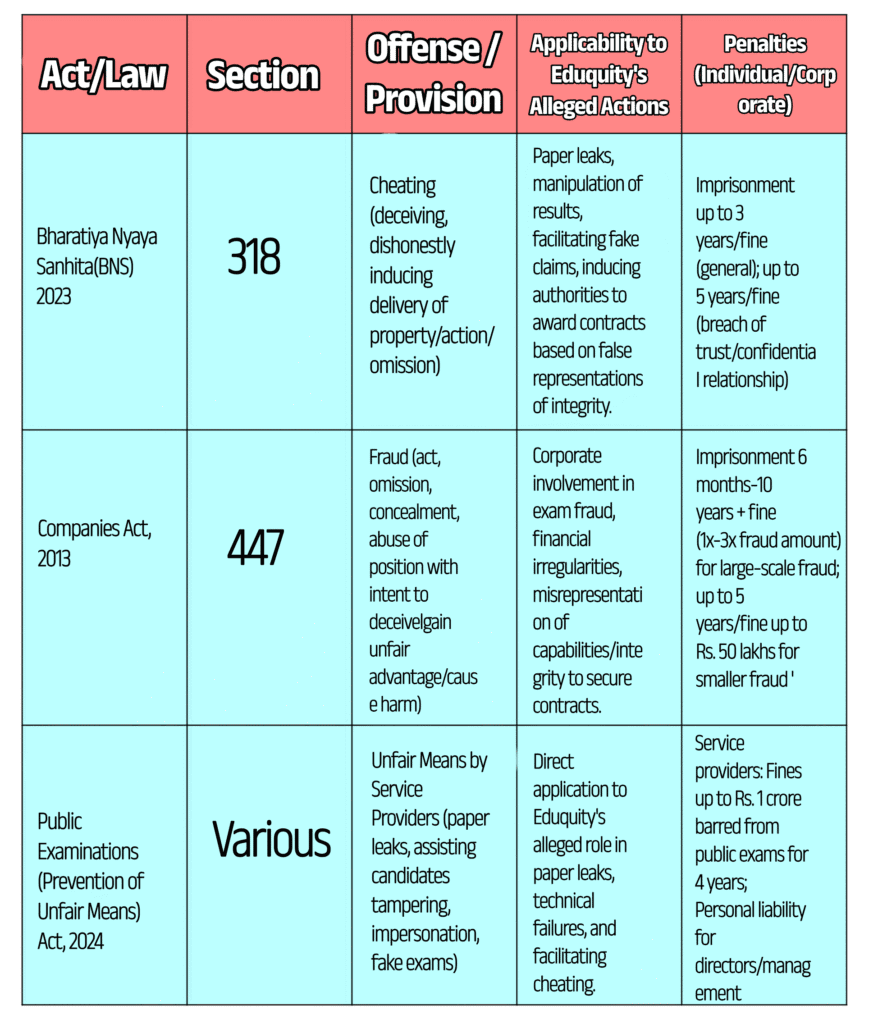
4.1 Bharatiya Nyaya Sanhita (BNS) liability 2023
A detailed definition of the term cheating is given in section 318 of the Bharatiya Nyaya Sanhita (BNS), 2023. It is a criminalization of an act in which a person deceitfully and with fraudulent and dishonest intent, induces another person to deliver by means of the deception, any property, to consent that property be retained, or to do or omit to do any act which he/she/they would not do or omit, had he/she/they not been deceived.The key elements necessary to prove this offense of cheating are false representation, knowledge of falsity, intent to defraud, procurement, and a conviction that an individual was/was not deceived.
Such acts by Eduquity as in subcontracting the MP Teacher Eligibility Test to a company which later leaked out the paper 5, facilitation of leakage of papers in other tests 5 and technical glitches that plagued the SSC exam in large numbers can be seen as misleading the contracting authorities (such as the National Testing Agency and the MPESB as well as SSC). This misrepresentation would have enticed these authorities to give and renew contract on false pretenses of being competent and reliable and also on false claims to integrity. The effect of this inducement was the granting of the property about the contract fees and non-performance of fair and transparent examination.
The BNS goes further to bring greater punishment to up to five years of imprisonment in case the cheating leads to wrongful loss to an individual whose interest in the transaction was confidential or shielded by law or contract.16 As an examination conducting agency, Eduquity was in a place of what can be described as great trust and had a contractual duty to certify that exams were conducted well and securely. Its purported flouting of this duty is a serious breach of this trust, which may face enhanced penalties under Section 318(3) BNS.16 Law Answers cat.
The BNS is intended to take action on not only plain lying but any dishonesty that brings wrongful gain or loss, including the present-day methods of: “cyber fraud and fiddling of digital documents”.
Incorporation of examination fraud in BNS 318 is a contemporary element of trust law to punish systemic dishonesty in government services. The element of breach of trust is most effective especially because it amplifies the nature of the crime to the status of full fledged fraud since these bodies conducting the exams have a special fiduciary like responsibility to the government and the candidates.
4.2 Corporate Criminal Liability of the Act, 2013
Corporate fraud has a stringent structure, which is defined in the Companies Act, 2013, especially Section 447 and is punishable under it. Any act, omission, concealment of information or a misuse of position under the motive of deception, unfair advantage or caused harm to a company, its shareholders or the general community could constitute a fraud under this section; considering the magnitude of malpractice claims of millions of candidates , the alleged malpractices of Eduquity vis-a-vis fraud would be termed to be on a large scale.
This kind of classification results in stiff punishments which include up to 10 years of imprisonment and a fine equal to at least the amount of money involved in the swindle or up to three times of such amount. In case the extortion straight involving the mass populace, there is a dire minimum imprisonment period of 3 years.
Indian law subjects corporate bodies to criminal liability where the actions are done by the employees, directors or the agents of the company. Important legal principles such as the so-called Identification Doctrine are applied to transfer the mental state (mens rea) of key persons who comprise the so-called directing mind and will of the company to the company itself.17 Vicarious Liability Doctrine, as well, transfers criminal dimensions of crimes committed by employees in the scope of their duties to the company itself.
These principles are crucial as they ascribe criminal conduct to corporations even though a specific person who participated in the fraudulent practices may be hard to reach. The Companies Act, 2013, therefore offers a sound legal framework of putting the corporate bodies such as Eduquity on direct responsibility of the institutional fraud leaving behind any personal responsibility. This is essential in preventing future malpractices because it will hit the organizational structure and financial status of the company.
4.3 The Public Exams (Prevention of unfair means) bill 2024
Another major step by the legislature has been the Public Examinations (Prevention of Unfair Means) Act, 2024 (assented to February 25, 2024), which, in broad strokes, will criminalize a variety of practices commonly associated with cheating and integrity of the examinations, which include leaking of question papers, aiding it in an examination process, tampering with the computer network or data sources, impersonation, fake examination, fake documents or falsification of merit list record.
The Act subjects the service providers found to practice malpractices to heavy fines. These penalties range in fines up to 1 crore and exclusion in the conduct of any public examinations within four years.19 More importantly, the Act also provides the criteria of a personal liability against directors/management involved. 19 In case of organized crimes the Act prescribes even sterner punishment with incarceration of 5-10 years imprisonment, minimum fine of Rs. 1 crore as well as properties attachment and forfeiture.
The immediate enactment of this Act is an indication of the stringent impact that an exam scam like this has had on the society and to enhance the legal force trying to counteract the same and is apparently an approval of the Constitution as to check such an impact by way of law. The blacklisting and personal liability provisions of its service providers rightfully closes the loopholes and lapses in accountability that have seen most of the service providers escape action even after failing at an earlier time like Eduquity. When strictly implemented, this Act is likely to change the game in terms of proper accountability within the examination sector.
5. Constitutional Analysis- Breach of Fundamental Rights
The purported malpractices committed by Eduquity Career Technologies are not only criminalized in nature but also mentions serious issues which pose a threat of infringing the basic rights that has been given to the students by the Indian law of the land.
5.1 Right to Equality (Article 14): Arbitrariness and Un-equality of opportunity
Article 14 of the Indian Constitution forms a fundamental tenet of democratic government as equality before the law” and equal protection of the laws” is guaranteed to every individual person in India.21 Article 14 does not allow discrimination and prevents individuals in the same situation to be treated dissimilarly.
Article 14, interpreted by the Supreme Court of India broadly, has been used to attack arbitrariness in state action with an aim of highlighting that equality is in its core antagonistic towards arbitrariness of decision making.
The purported malpractices of Eduquity such as leak of papers, manipulated marks and the decision to select a blacklisted vendor to provide crucial examinations; specifically to the common man, bring an aspect of arbitrariness to the commonly advertised jobs by the government.
This fundamentally unlevels the playing field where merit is compromised and deserving applicants are disadvantaged unfairly vis-a-vis those successful owing to illegitimate means.14 The frequent student uprisings as witnessed against the SSC are a direct reflection of this perceived arbitrariness and unequal opportunity.
The endemic practices of exam fraud in the manner of Eduquity and others has subverted the constitutional vision of providing equal opportunity in the field of public employment with the entire system coming across as pure lip service. This is a serious lapse of the social contract between the state and the people especially the young people who run to public service since the actions by the state (or lacking of) in contracting and supervising the exam bodies is perceived to be arbitrary and biased.
5.2 Right to Life and Personal Liberty (Article 21): Line of Right to Livelihood and Fair Process
Article 21 also provides the protection of life and personal liberty24, which the Indian judiciary had interpreted broadly to cover many other aspects in the need of a dignified life including the right to livelihood.12 The scandalous Vyapam scam is just one of the best examples of why mass examination malpractices not only crippled the working of the state but also tainted these employment opportunities and the livelihood of many citizens.12 And the right to fair and just process is also implied in Article 21 where no citizen is deprived of their life or liberty.
On the one hand, the reported fraud and mismanagement perpetrated by Eduquity directly affects students right to livelihood because it takes away their careers and turns years of work into vain.5 On the other hand, the resulting impending collapse of the education system, the destroyed future of lakhs of students 7 are also direct violations of this right.
The connection between the fraudulent examinations and the breach of Article 21 underlines how the systemic corruption of the public services may violate the most fundamental human rights and lead people into economical insecurity and mental breakdown. This promotes the concern beyond an blame on administration level to a question of principal human respect and social fairness.
5.3 Enforcement by the Courts of Directed Students
Student victims in India have great channels of seeking remedy through the court to correct error in examinations and procurement of their fundamental rights. They may petition High Courts of Article 226 of the Constitution 26 or the Supreme Court under the provisions of Article 32.26 A High Court has the power under Article 226 to issue different writs and orders to enforce both fundamental rights as well as any other legal rights with the areas of heiroglyphic jurisdiction.
Any such petitions may also demand various reliefs such as the re-conduct of compromised examinations, cancellation of fraudulent results, the initiation of independent investigations; and in some cases, even financial and psychological compensations to the financial losses and mental trauma incurred by the aspirants. As a practical illustration of students seeking recourse through the constitutional provisions, it suffices to mention the plea of the over 150 students before the Bombay High Court, seeking a re-conduct of the Maharashtra MBA exam in which Eduquity was involved.5 The existence of constitutional remedy is a vital source of accountability and redressal and acts as a power tool that allows students to approach various authorities against failure to take any action or a collusive state in cases involving exam frauds. Nevertheless, the costs of lawsuits to individual students are also indicative that the government should implement protective measures to ensure that the actions like the ones committed by the above-mentioned school are not possible to occur at all.
6. Claims of Political Interference on Awarding of Contracts
The allegation stated in the user query to each of these is particularly that Eduquity Career Technologies donates to political party to get contract. To answer this claim, a critical study of the research material given should be carried out.
6.1 Analysis of the political donations to get contracts Claim
According to the given piece of research material, one cannot find direct evidence and particular reports that directly connected Eduquity Career Technologies to political parties contributions or electoral bonds issued in the exchange of government contracts. Clips on political donations 27, are mostly concerned with general concerns of people claiming false political donations to the authorities as tax deductions without involving Eduquity with such cases in order to procure contracts. Even the corporate information about Eduquity presented on the snippets 9 (on its Web site) does not disclose anything on political affiliates affiliations or donations. Thus, according to the presented data, it is impossible to confirm the statement that such as Eduquity Career Technologies make direct political contributions in order to win contracts.
6.2 Incidences of Political Affiliations in Irregularities of Exams
Although there is no immediate evidence of monetary donations by Eduquity, the research content still does show some major political links on those cases when Eduquity was linked in the examination malpractices.
This implies an indirect political influence or patronage that can have continued exposure to the company because of its shoddy record.
Examples of such functioning include the paper leak in the Madhya Pradesh Teacher Eligibility Test, which was conducted by Eduquity, where it is stated to have happened in an institute owned by a BJP minister. There was also the very suspicious anomaly in the Madhya Pradesh Patwari exam (also widely exceeding in the problem of cheating under Eduquity) where of the top 10 toppers of the state, were reported to have attended the same examination centre which was owned by BJP MLA of Bhind, Sanjeev
The repetitive order of events 4, that a blacklisted company such as Eduquity again wins a lucrative public contract 5, and examination centers run by ruling party politicians face massive charges of irregularities 6, is highly suggestive of a political patronage or undue influence in awarding and execution of contracts. Less direct control may be as harmful as direct monetary contributions to undermining the integrity in the process of public procurement.
The general perception of many people such as the observation by an aspirant, “A blacklisted company will not be able to get a tender without an irregularity” , is that such sustained relationship with the company cannot be with no influence or favours. This trend points out a systemic weakness in that political ties may supersede due diligence and responsibility in government procurement.
It implies that the non-meritocratic situations induced by the vested interests in the dubious practices of such firms as Eduquity sometimes lead to the neglect or indulgence of the dubious recordbooks of the latter which is a major challenge to the honest tenets of governance and social trust.
7. Recommendations and Way Forward
To control the underlying problems with the alleged malpractices in the Eduquity Career Technologies and reinstate integrity and faith of the people in the Indian examination system a multi-faceted approach that consists of a combination of both legislative, administrative and judicial measures is needed.
7.1 Raising Governance and Building Regulation Capacities
Introduced in 2024, the Public Examinations (Prevention of Unfair Means) Act provides a much-needed legal foundation on which to fight exam fraud,19 but it will only achieve this with careful and effective enforcement. Centralized systems of monitoring and executing the blacklisting of companies should be put in place by all government departments.
This would ensure that black listed organizations like Eduquity cannot easily obtain new contracts with other departments or in other states and end up performing work after being blacklisted.5 To safeguard against disregard of failures of the past, inter-agency information sharing and communication on vendor behavior, integrity data, and blacklist status is important.
Moreover, the solid and irrevocable standards of vendor selection should be defined with the primary emphasis put on integrity, positive track record, and technical expertise, rather than other criteria, and with strictly defined punishments in case of non-conformance to the latter among awarding authorities.
7.2 Increasing transparency and accountability of tenders
There is more that needs to be done to increase transparency on awarding of tenders on the execution of the public examinations. This entails requiring the publication of very detailed criteria of evaluation, as well as technical and financial scores, of all bidders and also entails detailed reasons as to why the choice of vendors has been made where there is books of blacklisted that were inflammatory before, and so on.
Autonomous control structures ought to be set or given the authority to carry out auditing of purchasing decisions to ensure that there is tough adherence in terms of ethical and other legal provisions. Accusation to political influence or corruptness in contract awards ought to be thoroughly taken care of by independent bodies and any individuals or groups of persons proven to be indulged in corrupt activities should be taken to task to the optimum of the law. This would solve the issue that the population is raising that is who gives out these tenders and why blacklisted companies still get these tenders.
7.3 Redressal and Compensation Mechanisms in case of Students
To overcome this extreme effect on students, mechanism of providing judicial or quasi-judicial should be fast-tracked in allowing the aspirants to find redress on the exam anomalies promptly. They should allow re-examinations when need be, cancel the false results, instigate independent investigations and offer a source of compensation of the financial and psychological trauma faced by the affected students. There also needs to be policies put in place to handle the flaw of students becoming over age due to the constant cancellation and delay in exams, which may involve age relaxations or give a different course of action that will not be prejudicial to the career of such students.11There also needs to be a clear system of redressing grievances that can be reached out to within examination authorities like their bit more transparent and is swift, acceptable accountability to grievures raised out by students.
7.4 Prevention against Future Malpractices Stricter Punishment and Blacklisting
The severe punishment mentioned in the Public Examinations (Prevention of Unfair Means) Act, 2024 with its heavy fines and disbarment of service providers by individuals, and personal liability of the directors needs to be strictly enforced.
Blacklisting needs to become a real deterrent where the firms cannot hide under different names and managed to gain contracts via subsidiaries following blacklisting. This entails strong legal tools to evade faceless companies and follows beneficial ownership. Lastly, a robust culture of integrity should be cultivated on examination conducting agencies which should be audited regularly, independently, and with high level of training of the staff on ethical conduct as well as whistleblower protection facilities when dealing with malpractices which have occurred internally.
Eduquity Career technologies is a prime example of how rampant the issues that weaken the integrity of public examinations system are in India. The alleged trend of cheating and mismanagement by the company that consists of several high-security tests and has not disappeared even after the company was officially blacklisted has destroyed the lives of millions of students and their ambitions. Such a case illuminates deep-rooted structural frailties in the system of public procurement, such as the inability to ensure healthy inter-agency communication, due diligence, and an alarming potential to be influenced inappropriately.
The jurisprudence particularly reveals that the suspect activities of Eduquity and the concerned individuals are well within the pale of critical crimes as defined under the Bharatiya Nyaya Sanhita, the Companies Act, 2013 as well as the new Public Examinations (Prevention of Unfair Means) Act, 2024. Moreover, repeated anomalies are the manifest attack on the inherent rights of equalty and livelihood of students, which are accredited under Articles 14 and 21 of Indian Constitution. Although there is no direct evidence of political donations to win contracts in the given material presented, the empirical evidence of political associations with the centers involved in the scandal of fraud is a clear indication of a non payment based influence in obtaining and securing contracts for the provision of critical public services.
In summary, the strengthening legal frameworks are a good starting point however it cannot be held up as a major tool of accountability until there is a substantial administration that is strict and objective in enforcing the law. The most important is that the systemic reforms are necessary on an urgent basis and on a wide scale that would restore the faith of the people behind the examination system, protect the constitutional rights of the promising youth, and make meritocracy the pillars of government service in India. Millions of young citizens rest the future on the shoulders of the state which can never lack in insisting on fair, transparent, and incorruptible examination process.

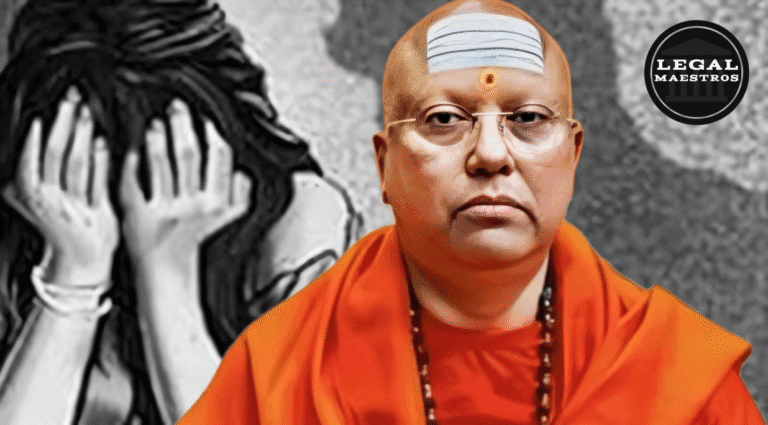

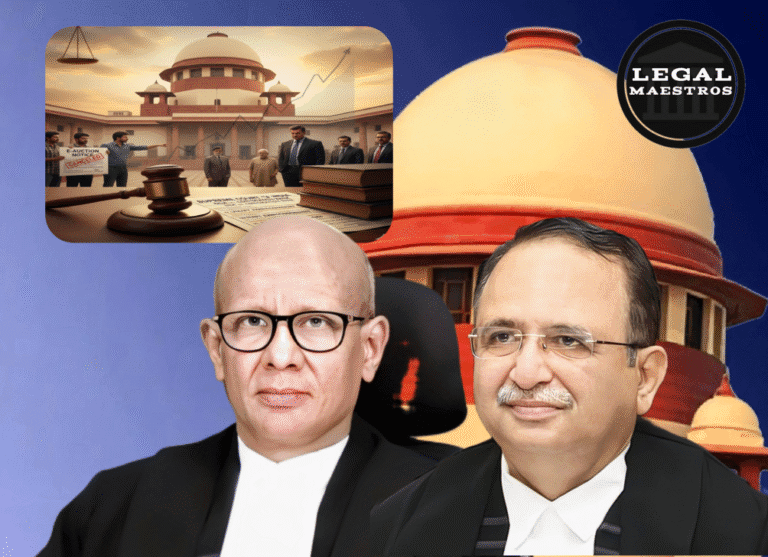
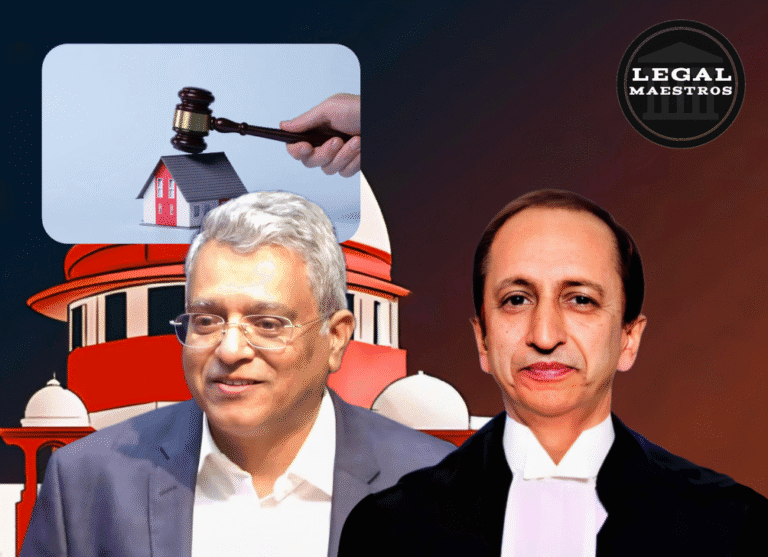
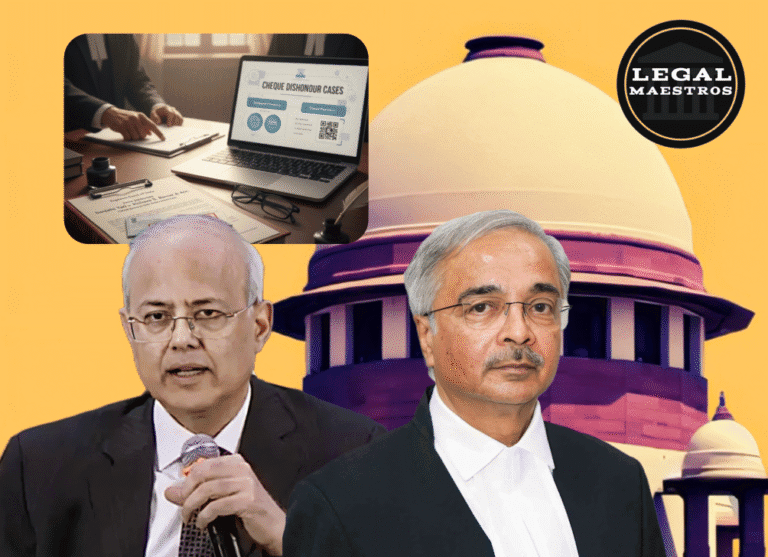
1 thought on “Eduquity Career Technologies’ Alleged Fraud, Political Donations, and Constitutional Rights Violations in the Wake of SSC Protests”